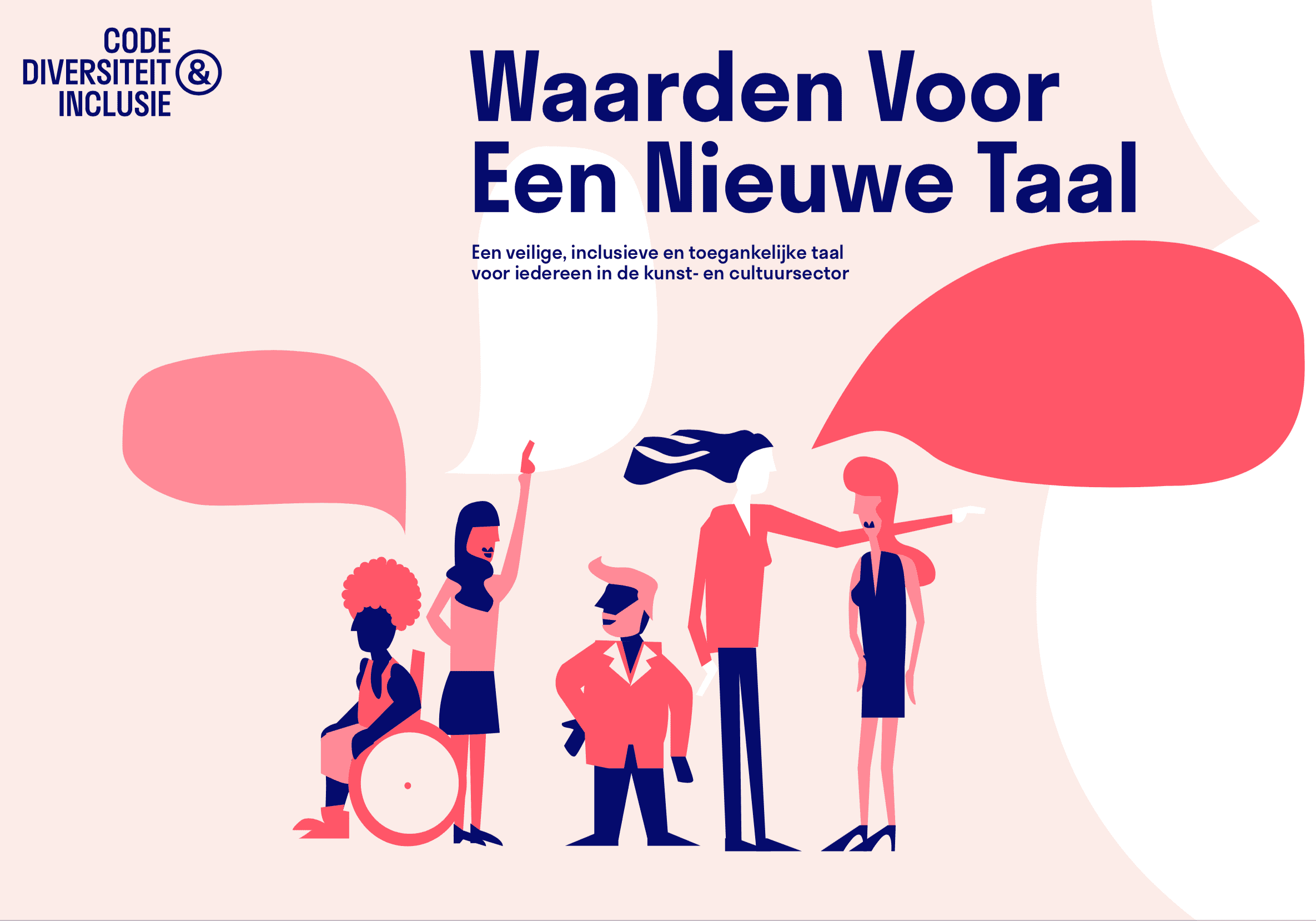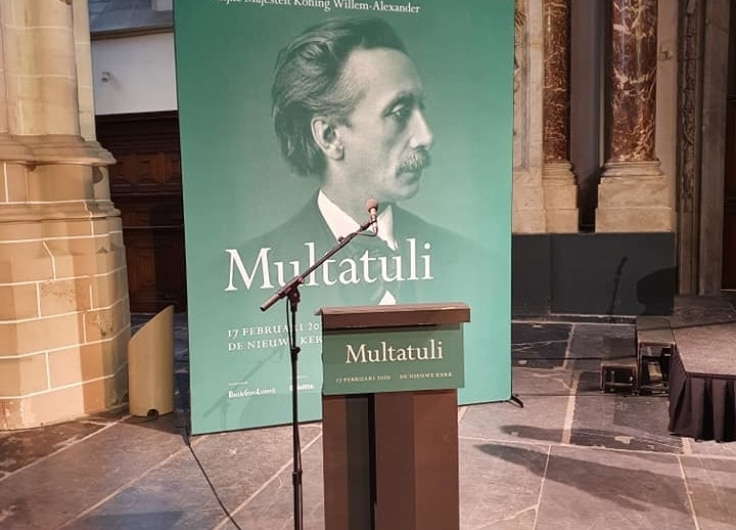Language is a representation of reality, which we use unconsciously. It thus reflects the prevailing relations in society, even if these are unjust. That is why it is necessary to decolonise language, writes scriptwriter and opinion former Raf Njotea. But because language is so elusive, imposed rules do not work well. What does work is raising awareness.
Arrival is a movie that depicts aliens as you hardly ever see them. There are no bloodthirsty, screaming creatures, no heroic pilots who, thanks to an ultimate manoeuvre, manage to save humanity just in time from total extinction. The film, a 2016 gem from director Dennis Villeneuve, is about linguist Louise Banks (Amy Adams). When twelve gigantic spaceships suddenly appear, hovering in various places just above the surface of the earth, Banks is hired by the U.S. military to make contact with the beings on one of those ships.
The beings appear to communicate by means of a type of ink cloud that they spray into the air in enigmatic circles, with no clear beginning or end. As Banks gradually gains more insight into the mysterious language, she notices that she is beginning to have visions, images of the past and future.
Guess what? Similar to the strange creatures, Banks unconsciously begins to see the concept of time as something circular rather than something linear from the past, through the present, to the future. By thinking in a different language, her thinking patterns changes, and her way of looking at the world.
 Image from the document ‘Handreiking waarden voor een nieuwe taal’ (Guidelines on values for a new language) from the Dutch organisation The Diversity & Inclusion Code
Image from the document ‘Handreiking waarden voor een nieuwe taal’ (Guidelines on values for a new language) from the Dutch organisation The Diversity & Inclusion CodeSnow
The idea that language is not only a way of expressing thoughts, but that it also influences or even determines thoughts, has been around for some time. This so-called Sapir-Whorf hypothesis is far from uncontroversial. The well-known example of Inuit, a language that has a multitude of words for different types of snow, is something that many linguists now firmly deny. But there is a connection between the language we speak and the way we look at the world, which almost everyone agrees on.
This is because language operates using images in our heads – it is a kind of representation of reality. For example, the word book itself is obviously not a book, but it does conjure up the image of a book. Now when we start looking at words that are less neutral, words with a certain connotation or undertone, it gets interesting. Take the word slut, for example. This is an irreverent word to refer to promiscuous women. Apparently, there is a need for a word to denote that. If we now try to find a word with a similar negative connotation for men, it turns out to be much more difficult. Possible options are player, Don Juan, or womanizer, but these are all much more positive. In recent years, the word fuckboy
has been appearing more frequently, which is a positive evolution, but it has not yet become as common as slut for women.
There is no Dutch word to talk about whites with the same derogatory connotation as when you speak of blacks with the word negro
There is simply no specific word in Dutch for a male slut. That actually says everything about how we look at the value of women, how we think about female promiscuity. You could make a similar argument about the word negro, but then in relation to white people. There is no word in the Dutch language to talk about whites with the same derogatory connotation.
Non-existent words
The words slut and negro are just two examples that show how language clearly says something about the prevailing perspective on the world. About how we (can) look at women and people of colour, respectively. The striking thing is that it almost always goes in that direction: for minority groups, there are words with a negative connotation, for the so-called majority groups such words do not exist. This is because language tends to move to the rhythm of the dominant group. This group is represented more strongly in positions of power, appears most often in the media, drafts the policy papers and does the communications; in short, the group that is most visible and has the greatest social influence.
This does not happen consciously. One of the difficulties of language is that we almost always use it unconsciously. We use it to communicate, but we don’t contemplate it. As a result, we maintain the prevailing perspective through our language. More than that: if we’re not careful, we can even reinforce it. After all, it is impossible to talk about the majority group using the same negatively charged terms, as those words simply do not exist. Minority groups thus risk being perpetuated in their potentially weaker position by the language we use, which is exactly why it is important to decolonise language.
Homophile
In the broadest sense, decolonising means breaking through structures and dynamics that are detrimental to certain groups in society. But how do you do that with language? One thing that certainly doesn’t work is imposing rules. Language is too intangible for that.
After all, the images in our heads that enable language change with time and the context in which they are used. For example, until the 1980s, the most neutral word to refer to a gay person was homophile. That word now has an offensive, negative connotation. Homosexual, which later became the standard, also no longer sounds very nice. And even homo seems to be replaced by gay or queer as most neutral descriptions.
In the broadest sense, decolonising means breaking through structures and dynamics that are detrimental to certain groups in society
There are countless other examples of words that over time have begun to conjure up other images in people’s minds. Each time, other words emerge that better fit the original image. But the context also determines the image a certain word has. A word like bitch has a completely different connotation when used at a party among friends than when used by a minister in parliament. Rules about which words you can and cannot use would therefore always lag behind.
Purity
There are no right or wrong solutions; the only way to decolonise language is to make people aware of the language they use. In particular, in three areas: first, in learning the contexts in which certain words may no longer be appropriate; second, in considering that words can be hurtful to some groups; and finally, in understanding that words can carry connotations.
Purely by talking about it, we are decolonising our language
For example, if we look at the words white and Caucasian, we see that Caucasian has long been, and continues to be, seen by most people as the neutral word to refer to people with light skin colour. But in recent years, it has been increasingly suggested that Caucasian is more likely to have a positive connotation, with associations of cleanliness or purity. Those who say so think white
is a more neutral word. Given its agreement with coloured as a neutral word for people with darker skin tones, that kind of makes sense. But just because white is now often used in a context of active anti-racism, some people, therefore, believe it has a negative connotation, a connotation of accusation.
As mentioned, there is no right or wrong in cases like this. I myself sometimes use white and sometimes use Caucasian, whereby I find that white has the added advantage of making people think for a moment, because it is still used less frequently and therefore stands out more. It makes people momentarily aware of their language, and therefore of their worldview. It makes people think for a moment that white is also a colour, that being white is not the standard.
Pioneering role
Of course, this is only a small act of resistance. It is the media and institutions that can really play a pioneering role in the decolonisation of our language. The Flemish newspaper De Morgen tried it for a while by no longer using the word allochtoon (immigrant), as the image the word conjured up in people’s minds no longer corresponded to its actual definition. Or take Merriam-Webster, the oldest American dictionary, which recently officially added extra meaning to the word they, namely that of the non-binary, third person singular. As a result, according to them, it is now grammatically correct to say, Sam lost their phone, with their referring to Sam. These are small but important steps in making people aware of the language they use.
These kinds of interventions will always be accompanied by social friction for some people, but that’s not a bad thing. By having the conversation about it, we are obliged as a society to think about it, and to be more conscious. Purely by talking about it, we are decolonising our language. This will eventually lead to changes in our worldview, which to a certain extent will also affect reality. If you pay close attention to our language, you may well, like the aliens in Arrival, catch a glimpse of the future of our worldview and – who knows – our world.








